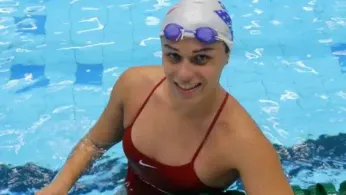
4 hours ago
World Aquatics Bans Hannah Caldas for Five Years After Gender Verification Refusal
READ TIME: 4 MIN.
World Aquatics, the international governing body for aquatic sports, has issued a five-year suspension to Masters swimmer Hannah Caldas after she declined to undergo a gender-verification test required for competition eligibility. The ban, effective until October 2030, also results in the annulment of Caldas’s results from June 2022 through October 2024, including her first-place finish in the women’s 100m freestyle at the 2024 World Aquatics Masters Championships in Doha, Qatar, and multiple victories in the 2025 US Masters Swimming Spring Nationals in San Antonio, Texas .
The disciplinary decision, announced by the World Aquatics Integrity Unit, follows months of controversy surrounding eligibility rules for transgender athletes in international swimming. Caldas, who also competed under the name Ana and has a long-standing presence in Masters swimming, has publicly criticized the requirement for chromosomal or genetic testing, calling such procedures invasive and unnecessary for recreational sporting events .
Hannah Caldas, aged 48, is recognized for her accomplishments in both national and international Masters swimming circuits. She began her competitive Masters career over three decades ago, and notably, she swam in the men’s division from 2002 to 2004 before transitioning and subsequently competing in the women’s category . In 2012, Caldas narrowly missed qualifying for the London Olympics while competing for Portugal .
Her recent performances at the 2024 World Aquatics Masters Championships in Doha brought renewed attention to transgender participation in women’s swimming events. At the Masters Spring Nationals in April 2025, Caldas won five events in the women’s 45-49 age group, drawing both praise and criticism from different segments of the swimming community .
Amid escalating debates on transgender inclusion, Texas Attorney General Ken Paxton initiated an investigation into US Masters Swimming (USMS) for allowing transgender athletes, including Caldas, to compete in female categories. Paxton’s office sought financial penalties for alleged violations of state trade practices, labeling USMS policies on trans athlete participation as “insane” .
In August 2025, US Masters Swimming completed a review of Caldas’s eligibility, affirming her right to compete in the women’s division based on documentation showing that she was assigned female at birth and identifies as female . However, World Aquatics maintained that its own eligibility policies require more stringent verification, including chromosomal testing, for athletes whose eligibility is formally challenged.
The Aquatics Integrity Unit stated: “The Aquatics Integrity Unit (AQIU) has imposed a five-year period of ineligibility on the Masters swimmer Hannah Caldas, running from 18 October 2025 to 18 October 2030, due to violations of the World Aquatics Integrity Code, the Policy on Eligibility for the Men’s and Women’s Competition Categories and the Operational Requirements to the Policy” .
Caldas’s refusal to undergo the requested testing was cited as the reason for the ban, with World Aquatics emphasizing the necessity of compliance with their integrity and eligibility standards .
In a statement shared via New York Aquatics, Caldas explained her decision: “Chromosomal tests are invasive and expensive procedures. My insurance refuses to cover such a test because it is not medically necessary… No U.S. state requires genetic tests for recreational sports events like these. Not even US Masters Swimming, the national governing body for recreational adult swimming in the US, demands this for any of its events” .
She added: “I understand and accept the consequences of not complying with a World Aquatics investigation. But if a five-year suspension is the price I must pay to protect my most intimate medical information, then it’s a price I am happy to pay – for myself, and for every other woman who does not want to submit to highly invasive medical testing just to swim in an older-adult competition… My life and privacy have been invaded enough. It is time to prioritize my health and personal safety” .
The ban has reignited global debate over the inclusion of transgender athletes in competitive sports, balancing fairness, privacy, and human rights. LGBTQ+ advocates and organizations have condemned the use of invasive testing as a barrier to participation, emphasizing the need for policies that respect both the dignity and rights of transgender people . Opponents of such inclusion argue for strict biological criteria, while supporters call for evidence-based, non-discriminatory approaches that avoid unnecessary exposure of personal medical information.
World Aquatics’s decision comes after the high-profile case of Lia Thomas, the first openly transgender swimmer to win an NCAA Division I title, and a subsequent Court of Arbitration for Sports ruling upholding restrictions on transgender athletes at the international level .
Caldas’s suspension highlights the ongoing tension within international sport between evolving understandings of gender identity and established eligibility frameworks. As more federations grapple with how to ensure both competitive fairness and inclusivity, experts predict continued legal, ethical, and scientific debates over the role of gender verification and participation rights.
For now, Caldas’s case stands as a flashpoint for conversations about privacy, bodily autonomy, and transgender inclusion in sport. She has indicated that she will not seek to return to competitive swimming, stating: “I have been swimming in sanctioned events for over 30 years, and I am prepared to let it all go” .
World Aquatics’s five-year ban of Hannah Caldas for refusing a gender-verification test has sparked significant discussion within and beyond the swimming community. The case encapsulates the broader challenges faced by sporting organizations as they strive to uphold both fairness and respect for all athletes, regardless of gender identity. As policies and public attitudes continue to evolve, the experiences of transgender athletes like Caldas will remain central to ongoing debates about inclusion, privacy, and human rights in sport.






